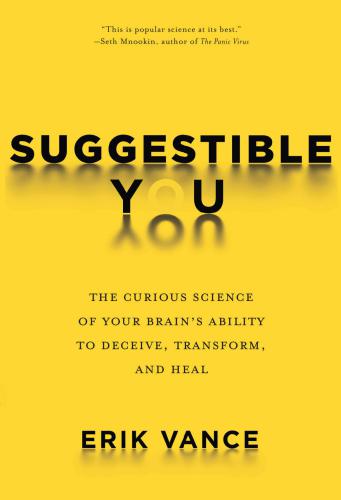
Suggestible You
The Curious Science of Your Brain's Ability to Deceive, Transform, and Heal
علم عجیب توانایی شما برای فریب، تحول و عقل
کتاب های مرتبط
- اطلاعات
- نقد و بررسی
- دیدگاه کاربران
نقد و بررسی

August 22, 2016
Science journalist Vance takes an inspired journey into the profound and often unnoticed powers of our brains. Perhaps the book’s most constant,
fascinating thread is Vance’s willingness to personally investigate each topic about which he writes. Many of the studies he outlines are described through his extensive conversations with the researchers themselves. In fact, Vance’s interest in the topic of suggestion began with having been seemingly healed by Christian Science as a child—an experience that becomes a recurring theme, deserving of its own standalone memoir. But the subject of the brain’s malleability leads Vance through a range of topics beyond his past, including hypnosis, false memories, and the challenges of measuring the efficacy of drug treatments. Supplementing this diversely experiential approach are compelling chapters on the science of the brain, in which the emphasis is not on finding the answers but on exploring the questions. Vance also presents a “Rapid Induction Analgesia Procedure” (hypnosis) exercise, though this seems to require a guided experience beyond reading. Most of all, he offers an understanding of the ways in which beliefs can lead to a better life. Agent: Susan Lee Cohen, Riverside Literary Agency.

September 15, 2016
The human mind is capable of astonishing feats, but does it hold the power to alleviate pain, or even cure disease, simply through suggestibility?The placebo effect, in which an inert substance relieves symptoms simply because the patient thinks it's an active pill, is among the most fascinating subjects in medicine. The importance of the placebo effect is so integral to clinical trials that no pharmaceutical study is permitted unless it compares the results of medicated subjects with those of a placebo group. In his compelling book, Discover contributing editor Vance, whose writing has appeared in Harper's, the New York Times, Scientific American, and elsewhere, chronicles his travels around the world and through history to detail the unexpected ways our lives and outlooks are affected by similar forms of suggestibility. Raised as a Christian Scientist, the author grew up in a community that believed God's healing power alone could cure any ailment. In an enthralling anecdote, he relives his recovery from Legionnaires' disease as a toddler and how the turning point of his near-death experience was his mother's abandonment of fear and trust in God. This is not to say that Vance is advocating religion in lieu of antibiotics--far from it--but in this and many other first-person narratives, he challenges traditional views on the effect of expectation, or suggestibility, on the physical body. He shows that modern neuroscience supports this line of inquiry. Brain chemistry has long been known to affect mood, regulate pain, and even affect gastrointestinal health, and cutting-edge techniques to map brain activity provide new insight. As the author frequently points out, if scientists are able to apply clinical data to the age-old mind-body problem, it may be possible to personalize medicine to an extent never before dreamed of. An eye-opening exploration of the intersection between philosophy and science and a fascinating peek into our innermost selves.
COPYRIGHT(2016) Kirkus Reviews, ALL RIGHTS RESERVED.

November 15, 2016
Vance was raised a Christian Scientist, believing in God's power, alone, to heal, before abandoning his faith, studying biology, and writing for such publications as Harper's, Scientific American, Slate, and Discover. Banking on humans' valuable, evolved ability to form expectations about their surroundings, placebo effects have been observed (though not always understood as such) since Plato's time. And though the FDA today requires new drugs to outperform placebos before hitting the market, a costly affair, the effects themselves have remained largely unstudied. Vance sets out to right this, as well as the idea that susceptibility to placebos is a mere weakness, by consulting the work of scientists past and present. He conducts countless interviews and puts himself in the patient's seat, enduring hypnosis, acupuncture, and even a brujo's curse, to find out what's what at this intersection of medical science and personal belief systems. Vance keeps the tone of this information-packed, impressive book conversational with jaw-dropping anecdotes and fascinating stories of real people. Mary Roach devotees just might have a new author to follow.(Reprinted with permission of Booklist, copyright 2016, American Library Association.)

























دیدگاه کاربران